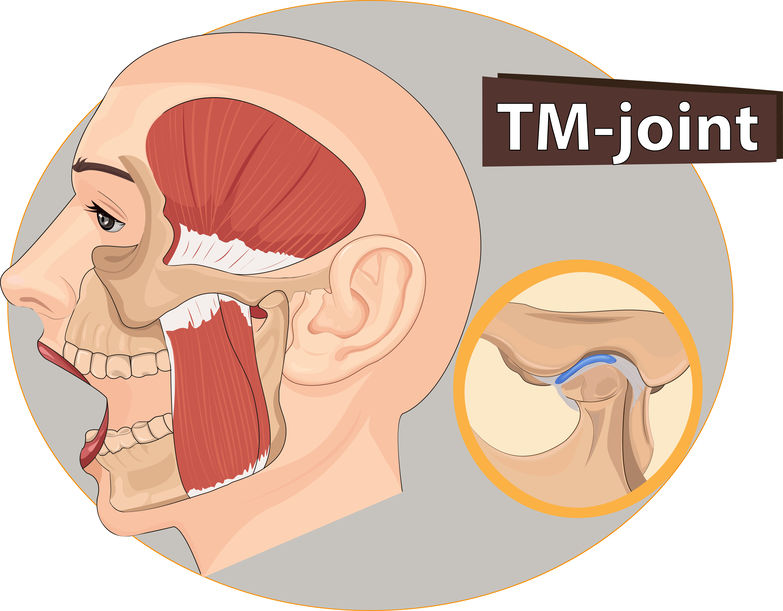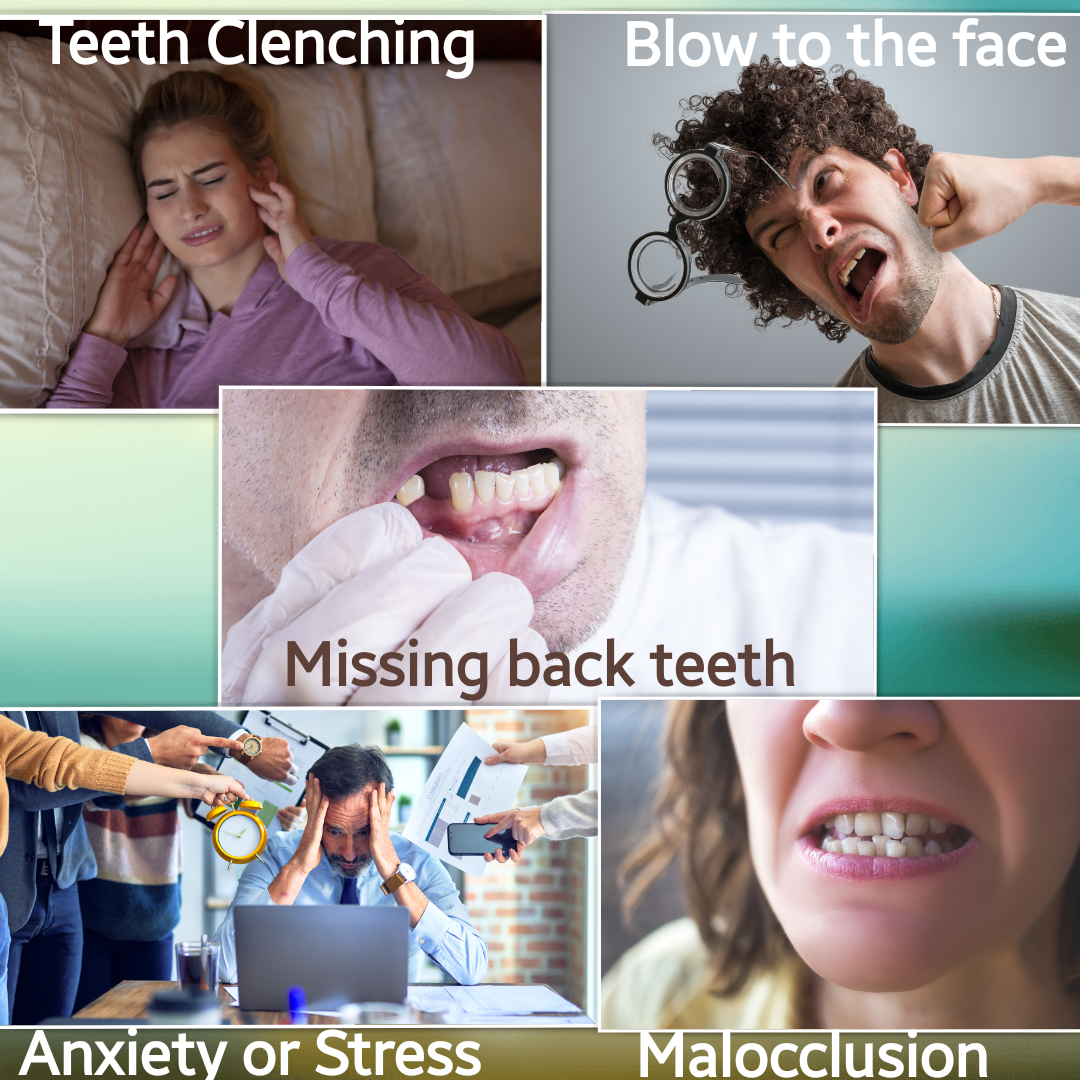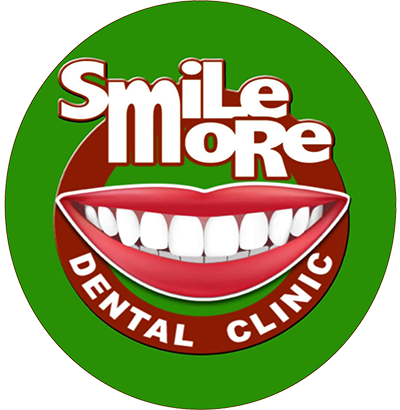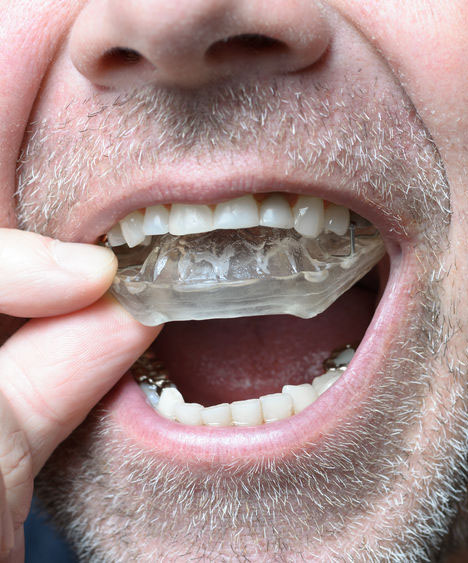TMJ Treatment
Temporo-Mandibular Joint (TMJ)
The Temporo-Mandibular Joint (TMJ) joins the lower jaw to the side of the skull and controls its movements. This joint is found in front of the ear, where two bones and a cartilage disc make the TMJ set-up. There are muscles and ligaments associated with this joint.
Temporomandibular Joint

Temporo-Mandibular Joint Disorder (TMD)
Temporomandibular Joint Disorder (TMD) occurs due to associated conditions upsetting the normal function of TMJ. This jaw joint dysfunction can develop wide-ranging symptoms that create annoyance and distressing situations. Usually, patients do not recognize the onset of this ailment. The common highlighted issue where we can associate TMD are:
1.) Constant teeth clenching and night grinding (Bruxism)
2.) Anxiety and stress
3.) Traumatic injury to the TMJ or hard blow to the face.
4.) Malocclusion and unseemly or inharmonious teeth coordination resulting in poor chewing habits.
5.) Missing back teeth (molars and premolars) that were not restored by
appropriate replacement in the form of implants, fixed bridges, or dentures.
The number 4 & 5 issues above are the most common initiator of TMJ problems observed in most TMJ cases we have treated.
TMJ-Associated Issues

With early detection and prompt treatment, the worsening of TMD can be prevented. Meaning, the condition can improve if taken care of earlier rather than not doing anything at all. Many people suffering from frequent headaches and facial pain should consider finding out if they are TMD-related.
What are the signs of TMJ disorders?
1.) Clicking and grinding sound on either side of the jaw when you open your mouth, indicating a disharmony on the jaw joint and the unlikely changes on the articular discs.
2.) Lockjaw when opening the mouth.
3.) A limited degree of mouth opening.
4.) Tenderness, discomfort, and pain of jaw joint(s) and the adjoining muscles.
5.) Dizziness, headache, or neck ache.
6.) Buzzing or fullness in the ear and earache
7.) Sleeping disturbance and difficulty
Non-Surgical Management for Better Relief of TMD
A misalignment in your jaws often causes Temporo-Mandibular Joint (TMJ) Disorder. This undesirable jaw position can lead to severe and broad concerns. Collective symptoms are felt, ranging from pain on the jaw joint, face, head, and even shoulders. Although, some patients undergo surgical management to dismiss symptoms. But such a method can be highly invasive, have potential after effects, and needs ample time for healing.
Smile More Dental Clinic in Ermita, Manila, offers a conservative approach to managing the TMD. We can focus on relieving the symptoms and taming the associated discomfort. We can provide you helpful tips to lessen and prevent TMD worsening. Considering the patient’s identifiable needs, we can treat the TMJ problem, not letting them go through the radical surgery option.
Surgical Treatment of TMD (Temporo-Mandibular Disorder)
TMD triggers dysfunction of the jaw and can promote wide-ranging symptoms that create annoyance and distressing feelings. TMD relates to the impaired or damaged temporomandibular joints. This versatile joint can get affected by an improper bite, uneven bite, improper chewing (especially in the absence of molars or chewing teeth). As your jaw functions under pressure and with missing segments, like the lost teeth, it becomes harder to chew food correctly, or compromised chewing happens. If this occurs, the ongoing wrong activity can result in faulty TMJ activity that affects the cushioning disc (TMJ disc). The routine action of chewing, talking, smiling, yawning, etc., can set off severity or slip of the disc out of place. Some patients take for granted the occasional discomfort and the clicking or popping sounds they experienced. These are tell-tale signs of TMD. Due to this event, the chewing muscles and ligaments are likewise strained and affected, and later on, become inflamed.
A more invasive approach is the Surgical TMJ Treatment and meant to treat the symptoms associated with the disorder. This surgery is intended to remove and replace the displaced jaw disk. Still, there is no guarantee as to whether future joint displacement can be prevented. If surgery is done, jaw realignment is possible; however, there is no assurance about the certainty of one hundred percent success with or without irreparable side effects.
Non-surgical TMJ Treatment VS Surgical Approach
Often patients are confused about what help they need to effectively combat the TMD that is a constant strain on their way of life. Indeed, no one wants to live and bear with the pain. Through a conservative, non-surgical TMJ treatment approach, we will consider the exact needs of an individual patient (customized). The procedures are not risky because patients will NOT be subjected to surgery; therefore, no recovery time and after-care management is associated. The non-surgical method means that there will be progressive treatment. This method focuses on relieving the symptoms felt, treating the underlying cause and their related symptoms. For instance, a bad bite or incomplete teeth linked to unexplained discomfort and pain can likewise be TMD indicators. We will fabricate an oral appliance called TMJ Splint that will shift jaw alignment to a suitable and comfortable placement to eliminate the stress on the joint. This oral appliance can also counteract the clenching and grinding of teeth–recognized TMJ disorder causes.
Non-surgical TMD Treatment at Smile More Dental Clinic
For TMD patients who are suitable candidates and wish to have effective management without going too aggressive in approach – the Non-Surgical TMJ Treatment method is the safer conservative route.
First, we will check and evaluate your teeth and oral cavity to study indicators of TMJ problems.
We will require diagnostics like TMJ X-ray, Panoramic X-ray, model cast (impressions), and pictures (if necessary). We will study them and note if there are potentially other causes of discomfort to rule out non-TMJ-related findings.
If need be, a Transcutaneous Electrical Nerve Stimulation (TENS), a method of pain relief using a mild electrical current in different modes and degrees, will be performed to offer therapeutic care. Depending on your needs, we will schedule them as required.
We will provide an oral appliance (TMJ Splint) that can significantly relieve the symptoms of TMJ disorders. In contrast to the surgical method, patients can skip post-operative distress, purely liquid nourishments or meals, and more extended downtime or period of recovery. Indeed, the benefits that a patient can get are: oral function improvements, greater physical comfort, and long-term oral health progress averting more serious and advancing TMJ problems that can turn your world down.
Get the TMJ Evaluation at Smile More Dental Clinic (Manila)
Through Non-Surgical TMD Treatment, we can help improve your general well-being. For sure, no one deserves to live under the shadow of discomfort and uncertainty, worrying if there will be productive management to stop the lingering ache of TMD. Contact us at (+632) 8 254 3773 and schedule your Consultation regarding TMJ care.
FREQUENTLY ASKED QUESTIONS ABOUT TMJ
What are the chief causes of TMJ Disorder?
When the jaw joints and associated facial and jaw muscles responsible for chewing, speaking, and swallowing are strained, TMJ problems can result. Bruxism (night-grinding of the teeth) that occurs involuntarily and habitually can tense the facial muscles and joints. TMJ syndrome can result due to traumas involving the jaw, the head, or the neck. Faulty bites (malocclusion) and missing teeth are most likely contributors to the development of the TMJ disorder.
What will you feel when you suspect to have TMJ Syndrome?
Most commonly, pain and tenderness can be felt near the Temporomandibular Joint, in front of the ear region. Another most likely symptom is the popping/clicking of the jaw (crepitus). Pain is similar to a toothache. Ear pain (earache) or sounds of cracking in the ears can be also be experienced.
Can Temporomandibular joint disease be cured?
In few cases, the symptoms of TMJ disorders may disappear without treatment. If your symptoms persist, your dentist may recommend a variety of treatment routes, often more than one, to be done when necessary.
Does dental insurance cover TMJ Management?
Generally, insurance should provide coverage for dental or medical-related treatment. However, due to the differences between the company or individual’s insurance privileges and contract, you need to clarify the treatment coverage with your insurance. You can check with your insurance before receiving Treatment or consultation, so you are well-informed. That way, you can also be prepared for the associated out-of-pocket expenses.
How much does TMJ Treatment possibly cost?
Like any other dental treatment, the initial step to knowing and getting acquainted with the illness is checking the patient. Next is requiring diagnostic aids like TMJ X-ray, cast impression, and other tools for proper and systematic treatment planning. Feel free to discuss your concern with your dentist.

